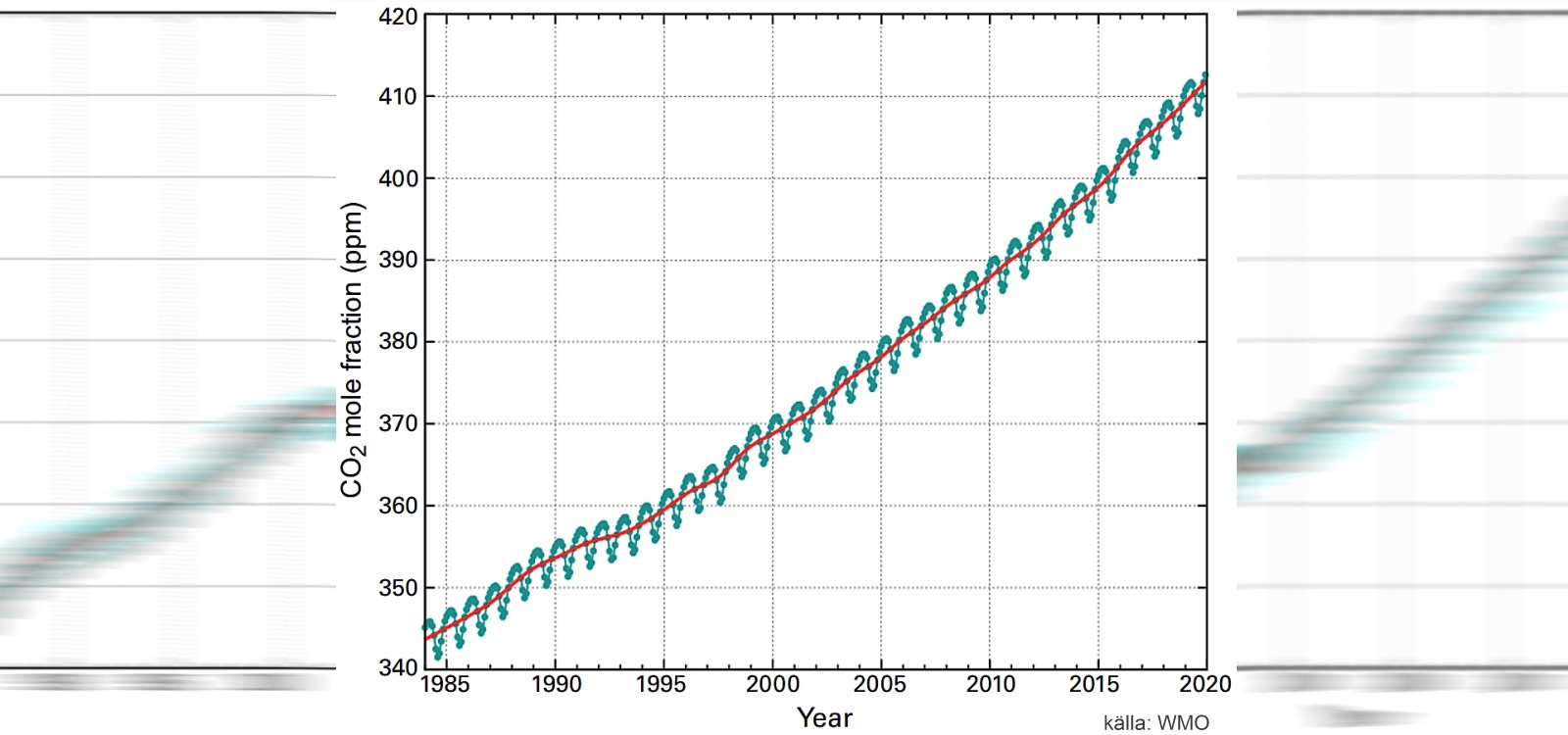So far, we have used a relatively rough categorical division of human characters into decent and indecent. Before the next
section, which deals with why it is proven
easier to spread false information than truthful information, we must therefore
nuance this overly rough division.
We probably know some people who believe in conspiracy theories or that science in general and Global Warming in particular
is just nonsense and fake news and may even actively try to spread their beliefs. At the same time, we would certainly not say
that they are indecent and equate them with immorality or malice.
In a discussion program on the Swedish National radio P1, 'Filosofiska Rummet' (the philosophical room), Erika Bjerström,
former foreign correspondent in the USA,
addressed what we have called 'fact resistance' or also 'confirmation bias'. The theme for this particular program was
Polarization (
link to the program, only in Swedish).
Other participants in the discussion were Henrik Ekengren Oscarsson, professor of political science, and Åsa Wikforss, professor
of theoretical philosophy.
Erika Bjerström brought up an interview she had conducted with an upper middle-aged man who lived and worked on his ranch in
Texas. She interviewed the man in his capacity as a Trump supporter and thus anti gun control. That is, he opposed stricter
regulations on possession, purchase and the right to carry (fire)arms.
The background was that Australia's conservative government on two occasions, in 1996 and 2002, introduced new laws (
NFA)
that involved greater regulation of gun licenses and the right to carry firearms. It offered the surrender or giver of firearms
completely anonymity and he/she was also being economically reimbursed.
A difference was seen relatively quickly in the frequency of murders, school shootings and suicides, which had previously been
thought to be linked to the more liberal rules on those rights. For example, the murder rate per 100,000 population fell from
1.6 in 1996 to 1.0 in 2004 (although this include all murders regardless of method). However, comparing figures from 1990, and
specifically firearm-related murders, to 2014, shows a 57% decline. The decline in school shootings was even more pronounced,
and suicides by firearm also declined. References to the figures can be found
here
and
here.
Hence, when the stricter restrictions on gun control were introduced, there was a significant difference, and a decline, in
deaths caused by firearms.
When Erika Bjerström had mentioned this to the man and wanted him to comment on the fact that stricter gun control laws
actually led to fewer fatal incidents such as school shootings and suicides and how this contrasted with the man's more
permissive gun control laws, the man had looked confused and not responded directly.
However, the interview continued and just before Bjerström was about to leave the ranch, the man had excitedly grabbed
her and asked her to come back into the house so he could show her something. Once inside again, he strode purposefully
to his computer and, almost apologetically, pointed to the screen that showed Google results regarding the effects of
Australia's stricter gun control laws. He said: "
- I'm sorry but I don't think you have the right information about that.
"He pointed to some Google results that showed that both violence and suicide had actually
increased in Australia.
Erika Bjerström had reviewed the hits, and as she said in the program, "
- I saw right away that this man and I will never
be able to meet in a real discussion because we simply have such fundamentally different bases for information gathering
and what we perceive as objectivity and truth."
The man's Google hits, from top to bottom, had been from sites like 'Breitbart' and 'Fox News' and similar 'Alt-Right' news
sites, while her information base came from studies that analyzed the actual numbers. That is, the articles that were written
with a scientific methodology as a basis. But she understood that the man would never trust such an information base and saw
Fox News and Breitbart as the irrefutable truth and at the same time the sources that "reveal" how things really are.
He had an intrinsic view that all information from the so-called "fake media" only had one purpose and that was to, together
with science, ally itself with the liberals, synonymous with the establishment, to access and maintain a political agenda.
The man, also a Trump supporter, would probably not be considered
indecent in the opposite relation to the definition of
decent that we made earlier. Is he one in the pile of evidence for the "cognitive dissonance" that we used earlier with the
meaning that we think we see that distinct groups' view of an authentic reality is distorted due to a total renunciation of the
intellectual instruments required to analyze basic causal reasoning? Or, less whimsically put, is the man described in the
example above just
an idiot?
Regardless, he would hardly be put in the basket of confirmation-seeking everyday narcissist.
We thus make this a partly semantic question. Doing something
intentionally indecent, that is, one realizes that one's action
is objectively indecent but carries it out anyway – we could categorize that as 'evil'. And 'evil' is a subset of indecentness.
One can therefore still be indecent without being evil.
We get away with only having parts of indecentness that do not overlap with evil or immorality by including another distinction
regarding indecentness:
We connect the cognitive functional variation that we have devoted a large part of essentiell.org to describing, to indecent
behavior because the 'function' itself is in relation to our civilizational survival. That is, since we link the very measure
of indecency to the degree to which a behavior actively or implictly oppose the sustainability or survival of Man, it justifies
that we can also categorize people like the man in the example as indecent.
That is a serious an important distinction so we re-iterate this:
That is, since we link the very measure of indecency to the degree to which a behavior actively or implictly
oppose the sustainability or survival of Man, it justifies that we can also categorize people like the man
in the example as indecent.
We thus have a range of personality types under 'indecency' that overlap with each other but, using the example above as a
description, not all of them overlap with 'evil'. In addition to confirmation-hungry people who demand confirmation of
themselves at all costs and who have no limits whatsoever to satisfy this need on the internet or via social media platforms,
one can fall into any of the following categories for being
indecent:
- You may lack education or be otherwise incapable, even if you tried, of analyzing even the
simplest causal connections. (The observant may object, however, that such a person, in the absence of intellectual
instruments, would statistically do as much indecent as decent.)
- You may live in a social context, both physical and digital, where it would cost too much to
have a different opinion. Even if you realize that the opinions you express are untrue or indecent, or perhaps you don't
care which. And by 'cost' we mean risking losing friends and a social connection.
- You may be stuck in the incredibly strong, and inherently polarizing, algorithms that mean
that no matter how you search for information online, you are only reached by information that you have always received the
information from before and that the algorithm 'knows' generates more clicks from you ('knows' = as in being programmed to
recognize).
- You may have completely lost trust in what goes by the epithet 'Mainstream Media' and
consciously only stick to a description
of reality provided by the Media that paradoxically is the one that is not true, or even tries to be. "Paradoxical", in the
sense that such a person's belief that the 'Main stream media' has a hidden and subversive agenda, entails a pattern of action
where one turns to the Media that really does have a hidden agenda and (un)consciously comes up with untruths. This point
partially overlaps with point 3. The man and the Trump supporter in the example probably belong to this category or the point
above.
- ( You may just be suffering from low self-esteem and are looking for whatever validation
you can get, wherever it comes from. One easy way to get it is through the spread of 'indecency' online. And we will
cover this in detail in the next section 'Internet')
The last point is put in parentheses because your desire to get confirming 'likes' by spreading polarizing lies may not be
done with a fundamentally 'evil' intention, but the end result will still be indecent. Although, as we said, we will address this
in detail in the next section, the reason behind this indecentness is that it turns out that the information that spreads
fastest and to the greatest extent is false information and not infrequently with an agenda that is polarizing, intolerant
and also, as it will turn out, information that contains elements that arouse disgust.
More (easy-to-read) information about conspiracy theories and vivid and bloated (false) made-up stories on the Internet and
why certain people or personality types are more attracted to them, can be read
here and
here, both from PsychCentral®.
With that clarification about our categorical division of humanity into decent and indecent and where the latter category does
not always include people who are 'evil', the consequence of these people's polarizing cognitive toolbox and unwillingness to
accept true information becomes a dangerous consequence for us all.
As a final example that there is justification for the division and that these people, strangely enough, actually share the
same aforementioned flawed intellectual toolbox:






 .
.